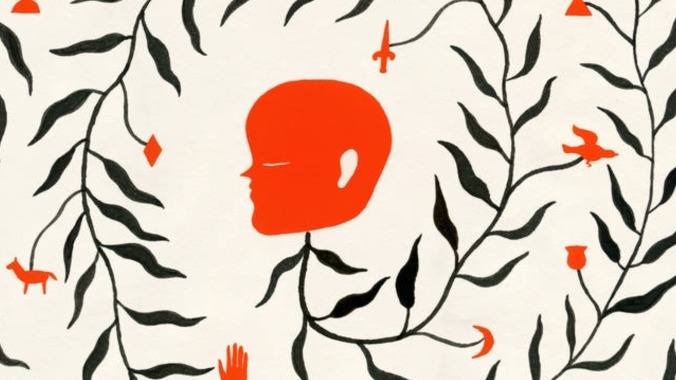Loma Rediscover Synergy on How Will I Live Without a Body?
The Texas-born trio unveil a haunting, icy album that reaffirms their commitment to folksy ambient and jazz.

The music Loma makes is spatial. It’s not spacey; if anything, the Texas-born trio always sounds locked in. It’s not always spacious; it usually feels closely held, like a kitten or a secret. Vocalist Emily Cross’s spectral voice plus Dan Duszynski and Jonathan Meiburg’s careful drumming, guitar work and keystrokes are a recipe for immersive, evocative music that feels like an icy breeze. It emanates like vapor, leaving droplet impressions on every surface. Over two albums—2018’s Loma and 2020’s Don’t Shy Away—Duszynski and Cross, who once performed in a duo called Cross Record, and Meiburg (of Shearwater and Okkervil River fame) have exhibited uncanny chemistry producing haunting, oddly relaxing indie. Their third album, How Will I Live Without a Body?, is a snowy, self-assured listen, another understated installment in Loma’s life to date.
Historically, Loma’s sound has felt indebted to the rolling prairies surrounding Austin, where Duszynski maintains a recording studio free from the distractions of urban Texas. “Black Willow”—off their self-titled record—exudes this energy between vocals reminiscent of a dramatic chorus and strategic key flourishes over a no-nonsense drumbeat. The Loma of How Will I Live Without a Body? is similarly reserved, but with a flair less becoming of the sparse grasslands and more suited to an English forest: verdant and full, yes, but presenting a solitude all its own. Loma spread field recordings, synths, guitar, percussion, clarinet and more across 11 tracks with careful precision, refusing to let any song get too bombastic or celebratory. There is room to be pensive amidst the abundance, their gentle cycles of tension and release resembling the joy of collecting mini-breakthroughs over a lifetime.
On How Will I Live Without a Body?, Loma revisit their trademark avant garde-indebted mix of ambient, free jazz and alternative folk, with songs leaning more or less abstract in pivotal places. Opener “Please, Come In” presents one of Loma’s more forceful drumbeats—with interjecting keystrokes and mounting vocals that almost elevate the song towards conflagration, Loma toe that line without ceding all control. Birds close that track and help bring in “Arrhythmia,” a sleek, propulsive number supported by an Afro-Brazilian-German percussion ensemble’s hypnotic performance. “Unbraiding” is more dramatic, with the tap-tap-tap of the cymbals and injections of distortion mounting and cutting under Cross’s unbothered delivery.
Cross’s vocal performance is part of what makes Loma such an enigmatic listen: Even when she sings “I can’t live with this feeling anymore” on “I Swallowed A Stone,” she is perfectly unflinching; it’s matter-of-fact but by no means blasé. Part of that may be that these are not her lyrics: Meiburg pens the majority of Loma’s words and Cross has the liberty to try them on and figure out how to inhabit those words like a true performer. Similar to her collaborators, she doesn’t pile anything extra behind her singing. Her voice’s natural pathos and Meiburg’s lyrics offer just enough emotion to fulfill the brief. When a more pointed effect is needed, like on “Pink Sky” or on key moments of the sprawling “Broken Doorbell,” Cross layers vocal takes; the aural double-vision snaps listeners into focus.
Where Loma consulted with their idol Brian Eno on sophomore album Don’t Shy Away, they now consult with Laurie Anderson—kind of. Anderson presented the band with a large language AI model she trained on her work, hoping the band would converse with it and see what kind of Anderson-isms it would provide. After studying a picture from Meiburg’s upcoming book project, AI Anderson produced two poems, one of which contained what would become the title. Its lines are peppered throughout. No doubt that the title it produced is hard to dislike—How Will I Live Without a Body is the best Loma title thus far—but the writing choice is hard to understand. It’s more commendable than consulting ChatGPT 3.5 for a lyric, but still a confounding choice when Meiburg’s writing has such a track record.
How Will I Live Without a Body? has all the fundamentals and many of the flourishes of a typical Loma record, showing that a band navigating geographic separation can collaborate as if they were all still in one place (Meiburg was working on a book project in Germany; Cross recently moved to Dorset). Their sound has a sunlit coldness, much wintrier than the dark, broad coldness found in the wee hours of Texas deserts. Cross is still the star of the show, even as it feels like Loma’s production has grown fuller than ever before. For a band with a haunted, minimal sound like this, How Will I Live Without a Body? mostly makes logical next steps; what may serve this band is a few illogical steps—more sampling, some confrontation, another long song or two per album—that showcase what the band is capable of beyond what they know they can do. This is a capable band—they could go far with the right risks.
Devon Chodzin is a Philadelphia-based critic and urban planner with bylines at Aquarium Drunkard, Stereogum, Bandcamp Daily and more. He lives on Twitter @bigugly.